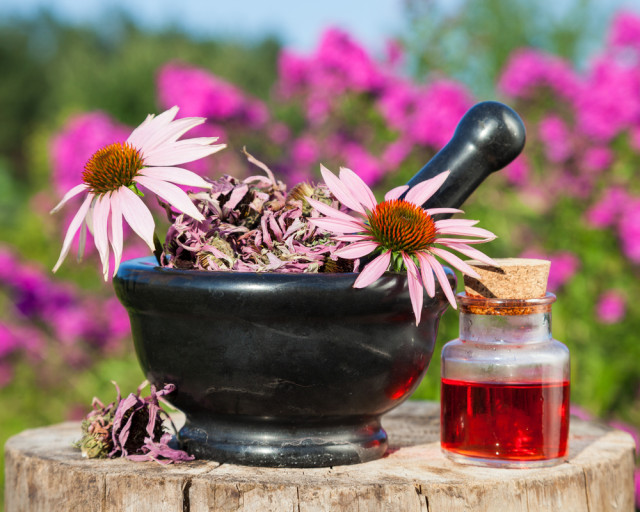
The tradition of using herbs for treatment of ailments dates back to a thousand years.
It also extends across many cultures around the globe.
Practitioners treat small wounds to severe diseases, using one or a combination of herbs. In present times, herbal treatment is considered to be an alternative branch of medicine, and there’s enough scientific evidence now to prove that this branch of science is beneficial for us.
Here is a list of seven herbs that are known for their immune boosting properties:
1. Astralagus
For hundreds of years, this herb has been used to restore energy and vitality. The herb is also known as Huang Qi. As an immune booster, it strengthens general vitality, improves digestion and builds up body’s defense against viruses. This root is used in tea and drugs. Astralagus root tea can be your first sip of immune boost in the morning.
2. Echinacea Purpurea
According to the National Centre for Complementary and Alternative Medicine, Echinacea Purpurea is known for its potent medicinal qualities. This herb is known to cure symptoms related to cold like nasal congestion and sore throat, pain relief, reduced inflammation and enhanced immune function. Echinacea is also known for its antiviral and antioxidant properties. The herb may interact with other herbs or supplements on consumption and trigger unknown reactions, hence it’s recommended that you take your physician’s advice before consuming this herb for any ailment.
The University of Maryland Medical Center (UMMC) warns not to consume these herbs if you are receiving immunosuppressant therapy due to cancer or organ transplant or any other health concern. Do not take the herb if you are pregnant. A health practitioner’s advice is recommended before you include the herb in your diet.
3. Thuja
Thuja Occedentalis is found in eastern part of North America. The tree is also grown in Europe and used as an ornamental plant. Thuja is used to cure bronchitis, bacterial skin infections and cold sores. It’s also used to cause abortions, hence pregnant women are advised not to consume it. It’s applied topically on the skin to fight skin infections and also used to boost the immune system.Thuja can be poisonous and people can be allergic to it too, so consult a doctor before taking the herb.
4. Sambucus
Sambucus is a shrub whose blue-black berries have traditionally been used to help fight colds and flu viruses. Sambucus is high in anti-oxidant called Anthocyanin. It stimulates the body’s own defences by producing anti-inflammatory molecules called cytokines. Don’t procure berries from the wild as the leaves, twigs, branches and the unripe fruit are poisonous. It’s recommended to consume the supplements of this herb like Sambucol that contain the herb’s extract.
5. Umcka
The Umcka herb is native to South Africa which is known for its anti-bacterial and immune boosting properties. It’s derived from the plant Pelargonium Sidoides, whose medicinal qualities have been utilised by African cultures for thousands of years. The uniqueness of this herb is that its immune boosting properties are greatly effective in fighting bacteria and viruses. Consuming this herb within 48 hours of the development of a cold can help alleviate it. If you don’t recover within seven days, you must consult a physician immediately and stop the medicine.
6. Sage
This naturally occurring herb is best known as a culinary spice that adds flavour to many recipes. The herb is known to stimulate the nervous system and digestive tract. It helps cure fever and is a blood purifier. According to the Phyllis Bach of Prescription for Nutritional Medicine, sage herb cures tonsillitis. Cooled sage tea can be used to cure bleeding gums. Rubbing teeth with sage leaves is also known to be a traditional oral hygiene practice.
7. Cardamom
Cardamom is basically a spice which also possesses herbal qualities. The spice is a native of the Indian subcontinent. The anti-oxidants present in this spice help fight free radicals in the body and prevent aging. It’s widely believed in Ayurveda that cardamom helps fight depression and is an immunity booster.
The above herbs can be used for immunity building, but they shouldn’t be taken without the advice of a herbalist or general physician.
Bonus:
Listen to this Green Divas Health & Beauty podcast for more ways to use food for wellness…
You can listen to the latest Green Divas Radio Show—and other green and healthy living podcasts—daily on GDGDRadio.com (or get the GDGD Radio app)!
image via shutterstock.com
 Vineetha Reddy is a regular practitioner and adviser of everything related to nutrition, fitness, health and wellness, she’s also begun to write and contribute to this knowledge ecosystem on sites like LifeHacker.co.in, StyleCraze.com and ElephantJournal.com. She strongly believes that the ingredients you find in your pantry provide the best benefits for good health. You can find her on Twitter.
Vineetha Reddy is a regular practitioner and adviser of everything related to nutrition, fitness, health and wellness, she’s also begun to write and contribute to this knowledge ecosystem on sites like LifeHacker.co.in, StyleCraze.com and ElephantJournal.com. She strongly believes that the ingredients you find in your pantry provide the best benefits for good health. You can find her on Twitter.
[dynamic-sidebar id=’Custom Widget 2′]
~Asst. Ed. Green Diva Christine | Images via Shutterstock.
ballerinaa
March 23, 2017 at 7:37 am
wow…In this article your showing tips for exotic hurbs.Such a wonderfull idea….
Fidha Ashraf
April 18, 2018 at 2:42 pm
Nice article. But I wonder whether from my place I may not be able to get most of the ones in the list. I could get plenty of cardamon, though. 🙂